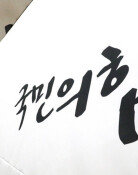IAEA Sends Second Inspection Team to Korea
IAEA Sends Second Inspection Team to Korea
Posted September. 19, 2004 21:48,
A second inspection team from the International Atomic Energy Agency (IAEA) arrived in Seoul on Sunday morning and began an eight-day long investigation which ends on 26.
The IAEA inspection team will gather samples of the 0.08g plutonium extracted in a 1982 experiment and attempt to determine why only 134kg of the metal remains from 150kg of uranium metal produced in the experiment, including the usage and whereabouts of the missing amount of metal.
They are planning to inspect the facilities where the nuclear-related tests were conducted, including the state-run Korean Atomic Energy Research Institute in Daejeon city and its research center in northern Seoul, and also interview the scientists who took part in the experiments.
The five-member team, led by Finnish IAEA official Saukkonen Heikki Antero (58), will conduct a Complementary Access approach investigation in an attempt to solve unanswered questions from a previous investigation conducted from August 29 to September 4.
After finishing their investigation, the team from the IAEA will leave for Vienna, Austria, where the IAEA headquarters is located, and begin to compare their gathered information with the data the Korean government handed over in August. The IAEA delegation plans to report the results of its investigation to the next IAEA board of directors meeting slated for November 25.
There is a possibility that an additional investigation team will be dispatched to Korea if they find the investigation to be lacking in some areas.
On the other hand, IAEA Secretary General Mohamed El-Baradei will visit Seoul on the fourth through seventh of next month to attend the Pugwash Conference and discuss matters of restrictions on nuclear weapons development projects and global security.
The Korean government announced on Saturday its four principles on the peaceful usage of nuclear power:
1. Reaffirming Seouls position of having no intention to develop nuclear weapons.
2. Maintaining nuclear transparency and strengthening international cooperation
3. Abiding by the Non-Proliferation Treaty (NPT)
4. Promoting the use of nuclear power in a peaceful manner
The government held a standing committee meeting of the National Security Council (NSC) on the same day and later held a joint press conference with South Korea`s Unification Minister Chung Dong-young, Foreign Minister Ban Ki-moon, and Science and Technology Minister Oh Myung at the Central Government Complex located in Sejongno, Jongro-gu, Seoul.
At the press conference, Minister Chung asserted, The government never had or conducted any plans for nuclear development projects for military purposes and will never participate in any international activity or exchanges related to nuclear development. Since South Korea relies heavily on nuclear power, Korea will try to acquire security in the use of nuclear power energy and promote the use of nuclear power in a peaceful manner with international trust.
On the matter of the extension of nuclear power usage, Minister Oh said, It does not mean that we will build an enriched uranium reprocessing facility. It means that we will actively conduct experiments on technology development, such as fourth generation nuclear reactors and nuclear fusion reactor.
taewon_ha@donga.com






![“설거지해도 그대로”…냄비 ‘무지개 얼룩’ 5분 해결법 [알쓸톡]](https://dimg.donga.com/c/138/175/90/1/wps/NEWS/IMAGE/2026/01/15/133164664.3.png)
